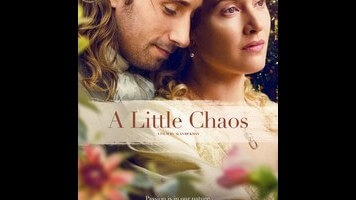Set in 17th-century Paris, where everyone speaks English in an English accent (save for a German duchess who speaks English with a German accent), the film commences with King Louis XIV (Rickman) commissioning an extravagant series of gardens for his palace. Because the task is too mighty for one man, even one of great brilliance and renown, Le Notre (Bullhead’s Matthias Schoenaerts) acquires the services of an unlikely new collaborator: Sabine De Barra (Kate Winslet), a French commoner whose green thumb helps her overcome gender and class bias to score the plum position. Tongues cluck and noses go up as this nobody becomes a somebody in the royal court. Le Notre, meanwhile, finds himself drawn not just to Sabine’s discerning eye, but also to her beauty and directness.
A frothier film, perhaps one groomed for success by Harvey Weinstein during the heyday of Miramax, might have sparked a playful battle of wills between the two professionals. But despite their opposing gardening philosophies—he’s a master of order and organization, she sees both as outdated virtues—A Little Chaos is a stiffer, more somber affair. Le Notre, who Schoenaerts plays without a hint of the seething masculinity that’s become his trademark, is stuck in a loveless marriage to an aristocrat (Helen McCrory) slightly above his station. Sabine, on the other hand, is a widow with a traumatic past; Rickman doles out clues through overwrought flashbacks, blurring the edges of the frame to give the scenes a bad-dream aura. There’s little heat between the two stars, as both seem too weary to telegraph the tsunamis of feeling supposedly raging beneath their period-appropriate attire. (The supporting cast fares better, with Stanley Tucci fluttering in to effortlessly steal a few scenes as the King’s conspicuously gay brother and Jennifer Ehle making a typically strong impression in an even smaller role.)
Between all the cautious fostering of affections, it’s a wonder that these two “clay kickers” have any time for their big project, the building of the gardens stone by stone, fountain by fountain. Not that this film about landscape designers gives two shits about landscape design: The taming of Versailles’ vast and verdant acres is depicted through a few vague montages, Sabine and her employer consulting some briefly glimpsed diagrams while talking shop. Here, gardening is more of a metaphor for relationships, and the characters don’t miss a single opportunity to directly compare themselves to greenery. “Like a good plant, I submit,” Le Notre tells his new co-worker, who later echoes the sentiment by confirming her need to adapt, “like a well-trained plant.” In case the point hasn’t landed, Winslet also delivers the floral equivalent of that celebrated porch speech from Sideways, in this case instructing the king on the importance of warmth and attentiveness while nurturing a rose.
To put it in the film’s own terms, subtext is a weed that Rickman just can’t stop himself from yanking. When he does cool it with the double-meaning garden gab, a poignant moment—like Louis The Great fondly remembering his dead queen, even as he acknowledges how arranged their marriage was—sometimes manages to bloom. But Rickman the director is less subtle than Rickman the actor, and he often drowns the sentiment in the torrential downpour of Peter Gregson’s bombastic score. (There are times when it feels like we’re watching an extended trailer for the movie, what with the endless music and montage.) For all the coded talk of blueprints, what A Little Chaos really hurts for is, well, a little chaos. It has the rigid dimensions of a bad biopic, just without much bio.









































